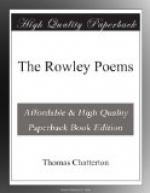his inclination’; and in this one must suppose
that he was actuated by a very natural irritation
at having been duped a second time by an expositor
of antique poetry, rather than by any snobbish contempt
for his correspondent, who had frankly confessed himself
an attorney’s apprentice. Chatterton then
wrote twice to have his MS. returned, asserting at
the same time his confidence in the authenticity of
the Rowley documents. Walpole for some reason
returned no answer to either application, but left
for Paris, where he stayed six weeks, returning to
find another letter from Chatterton written with considerable
dignity and restraint—a last formal demand
to have his manuscript returned. Whereupon, amazed
at the boy’s ‘singular impertinence,’
the great man snapped up both letters and poems and
returned them in a blank cover—that is
to say without a word of apology or explanation.
He might have acted otherwise if he had been a more
generous spirit, but an attempt had been made to impose
upon him which had in part succeeded, and he can hardly
be blamed for showing his resentment by neglecting
to return the forgeries. One may notice in passing
that when Chatterton, more than a year later, committed
suicide there were not wanting a great many persons
absurd enough to accuse Walpole of having driven him
to his death—a contemptible suggestion.
Yet the connoisseur’s credit certainly suffers
from the fact that he gave currency to a false account
of the transaction in the hope of concealing his first
credulity.[8]
We now come to the circumstance which procured Chatterton’s
release from his irksome apprenticeship—his
threat of suicide. He had often been heard to
speak approvingly of suicide, and there is a story,
which has, however, little authority, that once in
a company of friends he drew a pistol from his pocket,
put it to his head, and exclaimed ‘Now if one
had but the courage to pull the trigger!’ This
anecdote—if not in fact true—illustrates
very well the gloomy depression of spirit which alternated
with those outbursts of feverish energy in which his
poems were composed. And he had much to make
him miserable when with a change of mood he lost his
buoyancy and confidence of ultimate fame and success.
His ambition was boundless and his audience was as
limited in numbers as in understanding. He was
as proud as the poor Spaniard who on a bitter day rejected
the friendly offer of a cloak with the words ’A
gentleman does not feel the cold,’ and his pride
was continually fretted. He was keenly conscious
of the indignity of his position in Lambert’s
kitchen; he seems to have been pressed for money,
and though he ’did not owe five pounds altogether’
he probably smarted under the thought that all his
hard work, all the long nights of study and composition
in the moonlight which helped his thought, could not
earn him even this comparatively small sum. Again,
he was not restrained from a contemplation of suicide
by any scruples of religion—for he has left




